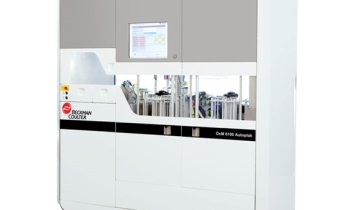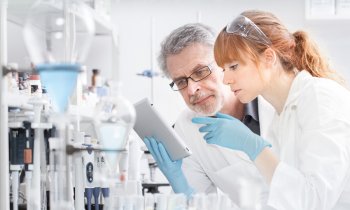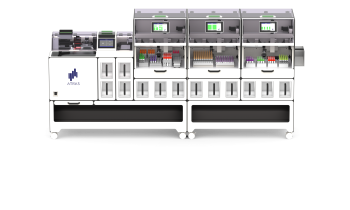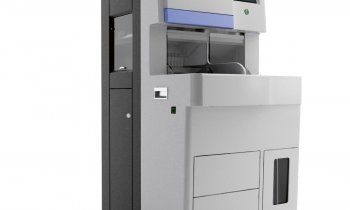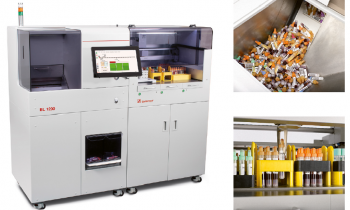Same-day diagnosis from hand-held device
Scientists in the UK are working to develop a hand-held testing device to provide same day diagnosis from a patient’s bedside. The device will use disposable cartridges and utilise printed circuit board technology (PCB) that will allow a fast and low-cost diagnosis.

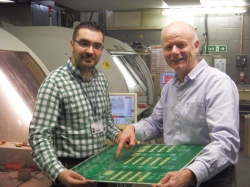
Initially, the device will be diagnosing tuberculosis (TB) but the technology is versatile and will in future be used for other conditions, using samples of blood or saliva containing patient DNA.The team from the University of Southampton say that the new device could replace the current conventional diagnostic method of enzyme-linked immunosorbent assay (ELISA), which monitors proteins such as cytokines, to identify a disease and measure its progression.
However, that is lengthy and is limited to single point measurements, due to the prohibitive costs and sample volumes required, preventing continuous monitoring of disease progression. Leading the research to develop the hybrid technology using electronic components as chemical sensors on PCBs is Dr Themis Prodromakis, a Reader in Nanoelectronics and EPSRC (Engineering and Physical Sciences Research Council) Fellow at the University of Southampton.
The device can carry out diagnosis on the same day and at the point-of-care – potentially avoiding the need to send protein samples away to laboratories for chemical assessment and diagnosis. Consequently, it could lead to public health benefits in reducing the time to treatment and reducing costs in both diagnosis and late-diagnosis treatments. Dr Prodromakis explained: “A project of this nature is the perfect illustration of how academia, manufacturing and the end user can come together to pool their knowledge and experience to make a real and valuable change.
“There is a real opportunity for this new diagnostic tool to make a tangible difference to healthcare not only in the UK but in international markets as well. “We are at a preliminary stage but hope that eventually this test will be available in hospitals, GP surgeries or even available for home diagnosis.” He said there are a number of benefits for clinicians, hospitals, health systems and patients. “It will ensure clinicians can provide a good diagnosis and treatment, and it will minimise costs,” said Dr Prodromakis. “For patients, it will mean they will get their results straight away and with no discomfort rather than having to have samples sent to the laboratory and them waiting for several days for the result. Patients will get the diagnosis when they need it.” The three-year project is in collaboration with researchers in the Department of Infection and Immunity at Imperial College Healthcare NHS, who will carry out all clinical trials, and Newbury Electronics, a manufacturer of PCBs in the UK which brings extensive knowledge of manufacturing techniques and materials to the work.
Philip King, who is a director at Newbury Electronics, said Dr Prodromakis and his team had come up with an “exciting” alternative to more traditional diagnostic methods. “It is now our job, as the expert manufacturers, to help transform this idea into a feasible product,” he said. “The inclusion of Imperial College as the clinicians to demonstrate the relevance of this research ensures that valid input from all sides is incorporated right from the initial stages.” The research is being funded by a £1m (800,000 euro), awarded by the EPSRC. At present Dr Prodromakis and his team are working with Newbury Electronics to gain a better understanding of the PCB manufacturing process and how this can be refined and amended to use alternative materials and to finer degrees of accuracy. The aim is for the first prototypes to be available for initial testing by next year.
Profile
Dr Themis Prodromakis is a Reader in Nanoelectronics and EPSRC Fellow affiliated with the Nano Research Group and the Southampton Nanofabrication Centre of ECS at University of Southampton. He is also an Honorary Research Fellow within Imperial College London. He previously held a Corrigan Fellowship in Nanoscale Technology and Science, funded by the Corrigan Foundation and LSI Inc., within the Centre for Bio-inspired Technology at Imperial College and a Lindemann Trust Visiting Fellowship in EECS UC Berkeley. His background is in Electron Devices and micro/nano-electronics processing techniques, with his research being focused on bio-inspired devices for biomedical applications.
24.06.2014





